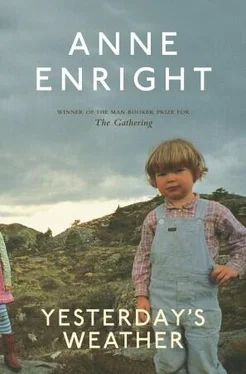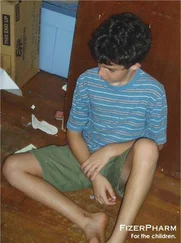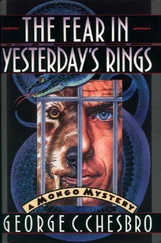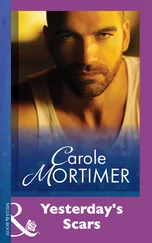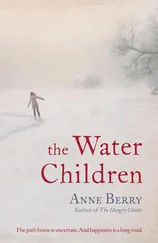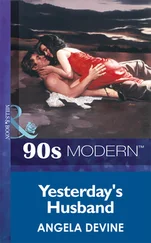He must be covered in bruises, she thought, with the sound one day of a dish hitting the kitchen floor: the crash followed by three more, so regular they may have been deliberate — and how was he going to clear that up? Coming down in the morning with his feet bare. She picked her own feet up in sympathy, quickly. One. Two.
It was unbearable. Della went upstairs and cleaned the mirror of the bathroom cabinet, and looked at the picture of herself in there: an old woman she didn’t know. Nothing to do with the young woman pushing a pram, or the middle-aged woman watching, as he walked behind his wife’s coffin, the face of Tom Delaney made frank and obscene by grief. It was indecent, she thought at the time, to go to a funeral with no forgiveness in your heart. There was no luck to it.
Was that what had gone wrong? Della tried to see herself in the bathroom mirror but she saw, instead, Any Old Woman: someone whose kindness did not matter.
She took the soap dish and banged on the pipe that led down from the cistern to the back of the toilet; a thin, unsatisfying sound, of plastic against plastic. She cast about, found the Olbas Oil in its little thick bottle, and reached for the ceramic of the cistern itself. Then she tapped three times.
It came that evening — mortifying: One. Two. Three. He was knocking on the spot directly behind the mantelpiece clock. Della picked up the poker and, with a dangerous surge in her thin old heart, tapped back, twice. The silence that followed reminded her of leaning in for a kiss, or deciding to lean in, and when the returning knock came she was off at the sink making a cup of tea. Enough was enough. She would have to buy a packet of biscuits tomorrow, and pretend that nothing had ever happened, and ring the bell next door.
The boys playing by the river did not have private parts, she realised, when she woke at dawn and found herself still in the old chair downstairs. They were blurred at the crotch, as angels might be blurred. It was not that their penises did not exist, it was just that she could not picture them — the one that belonged to the boy with a stick, for example, hanging down as he leaned out over the water, straight as a plumb line. She could think of it, but she could not see it, even though she knew it was there.
The lump of twigs and leaves, on the other hand, became more clear, cut the water more sharply; it pulled through the flow like an opening zip. Della could not imagine it as anything else: a dead dog, for example, or a living water rat, or the periscope of some unlikely submarine. The twigs and leaves remained just what they were. For which she would always be grateful.
Because there was something about the scene that she had not noticed before; a different quality. If she thought very hard about the black of the river and the whiteness of the boys (were there four boys, or five?), if she let them be — let the boy with the stick reach for the water, let the watching boys shift from one foot to another, and the water flow on — if she did not try too hard, she could sense it, there in the picture. Music. Very beautiful. It was hard to say what kind.
‘Hello, Tom,’ she said at the door.
‘Della?’ he said. And she was reminded of his tone outside the newsagent’s, saying her name with a voice that, if you shut your eyes, was the voice of true love.
‘I have some biscuits,’ she said, obliging him to let her in. And when he did — the devastation of the place.
‘Ah, Tom,’ she said. ‘Would you not think of the Meals on Wheels?’
‘I did, sure,’ he said. ‘Until they took my radio.’
‘They did not.’
‘They were cute enough. They left me this one, instead. Except it’s full of holes.’
And he made his way unerringly to the radio on the table, which was an ordinary radio with ordinary holes in it, for the sound to come through. Della’s own sight wasn’t the best — she had to admit it — but at least she knew what she could or could not see. It was typical of Tom Delaney that he wouldn’t go blind just because his eyesight deserted him. It was typical of him not to let on. Della was so annoyed with him she forgot herself, and spoke as if they had been close, all these years.
‘I’m too old to be cleaning up after you,’ she said.
Though there was a solace to it, too, getting a brush and shoving the whole stinking lot out the back door. Much easier, she thought, than cleaning up your own place. Lord Lucan sitting behind her at the table patting the holes in his radio or reaching his soft fingertips to the plate of biscuits. You couldn’t even begin to tackle the sink. She would have to get Margaret on to it — at least get her to ring the social services. Poor Margaret, with three teenage children and no husband in Glasnevin, and the breasts that Tom Delaney had mocked in 1964 just a nuisance now, when she ran for the bus. And it seemed so absurd to Della — the thirty years that these things mattered, out of the eighty years that made up a life, eighty or more — that she found herself laughing out loud.
‘What’s the joke?’ said Tom Delaney.
‘Nothing,’ she said.
‘Don’t let me stop you,’ he said.
‘I won’t, so,’ she said.
And he turned his face to her; gleeful, like he could see her quite clearly — a woman in his own kitchen who was far from being a virgin, a woman who would, no doubt, find him quite attractive, in the end.
I like Gertie, but she just doesn’t get it. Her and that pair of vultures she works with, always sniping — a sort of dizzy silence when I walk into the restaurant and then all business as usual; wipe the fingerprints off a glass, smooth a tablecloth down just so. Of course they’re jealous — the vultures I mean: young women you can see closing up over the years, getting bitter. But I expected more from Gertie.
Sometimes I feel like packing it all in. I said as much to my mother, I said I wanted to start over somewhere else. France — why not?
‘Oh, this town is very small,’ she said, and she looked out of the window at the passing street.
‘No, Mam,’ I said. ‘That’s not good enough.’ But she is right, of course. It’s the little things that get to you. It’s the little things that make you turn to the window and wonder how long you have left, before you can decently die.
Mam was a beauty: she had that to contend with. There are still women who will not talk to her after Mass because of what their dead husbands said once, or did not say, when she walked by.
And of course I went to the ‘better’ school — St Matilda’s. Years of chilblains and semolina; the French teacher whacking you over the head with Maupassant, in hard-back — Miss Nugent that was, or should I say Mamselle Noojong — six years of misery so you could catch a man with a better-cut suit and maybe a four-wheel drive.
‘You are the future,’ said Sister Albert, sending us back to be hated in hotel bars from Birr to Crossmolina for our T-strap stilettos and our taste in Campari and lime. I’d rather be dead, I said. But, ‘Why not?’ said Mam. ‘Why not marry a nice, well-to-do man?’ I said there’s better ways to earn your new Sanderson curtains than on your back — I’d get the money myself. Or no money, if that’s the way I wanted to play it. And I packed my bag for uni and shook the dust of that damn town off my feet.
Now here I am. Back again.
Gertie was a Matilda’s girl too, of course. She was three years ahead of me, and I thought she was really beautiful, and really dull. Or something worse than dull — the way Sister Albert smiled so sadly at her, and Gertie smiled so sadly back. Gertie was a saint. She tried to use a tampon once and fainted against the toilet cubicle door: ker-klunk. She never did leave the town. She married the man she was supposed to marry, and she got the curtains she was supposed to get: he drinks every day now from half past twelve, and Gertie says he’s infallible when it comes to a good Bordeaux.
Читать дальше
